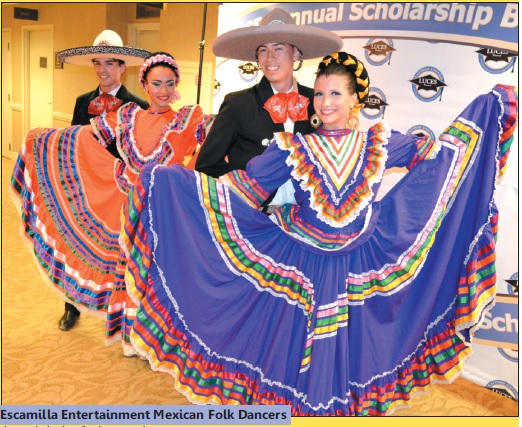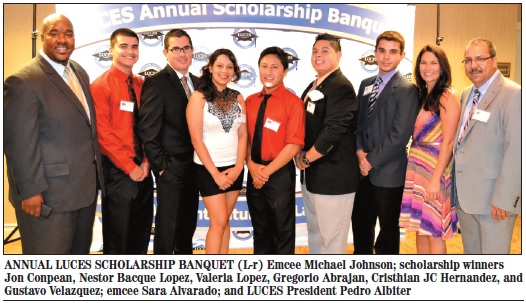
Dr. Enrique Figueroa keynotes LUCES Scholarship Banquet
by A. David Dahmer
Latinos United for College Education Scholarships (LUCES) recognized Latino scholars for their academic achievement and community service with scholarships sponsored by local businesses at the fourth annual LUCES Scholarship Banquet at the Madison Concourse Hotel on Friday, Aug. 15.
Michael Johnson, president and CEO of the Boys and Girls Club, and Sara Alvarado, president of Alvarado Real Estate, were the emcees of the event. Pedro Albiter, founder and president of LUCES, spoke to the packed crowd to open the event.
“Ladies and gentlemen, this night is not about you and me. It’s about recognizing these six great and talented Latino scholars selected by our scholarship committee based upon their academic achievement, community service, and economic barriers,” Albiter said. “These students represent our future and will become our future leaders if we help and guide them through their careers.”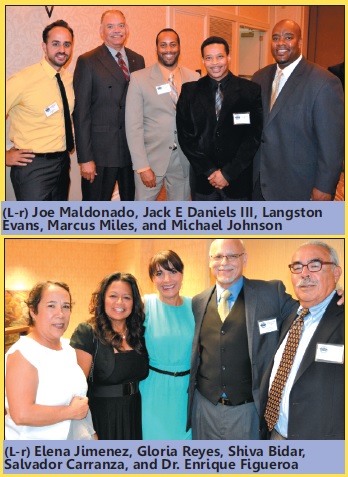
LUCES is a nonprofit organization that works to ensure bright futures for young Latinos in Wisconsin by providing several merit- and need-based scholarships. The annual scholarship banquet is one of their signature events. The LUCES Scholarship Awards were as follows:
• Salvador Carranza presented Nestor Bacque Lopez with a scholarship from the Latino Education Council
• Kevin and Jill Carey presented Gustavo Velazquez with a scholarship from The Carey Group
• Dr. Silvia Romero-Johnson and Mr. Larien Johnson presented Valeria Lopez with The Romero-Johnson Family Scholarship
• Sherry Lindgren presented Jon Compean with the Murphy Desmond S.C. & LUCES Scholarship
• Steve Goldberg, executive director of the CUNA Mutual Foundation, presented Gregorio Abrajan with the CUNA Mutual Group scholarship
• Christian Albouras, LUCES board director, presented Cristhian JC Hernandez with the LUCES Scholarship.
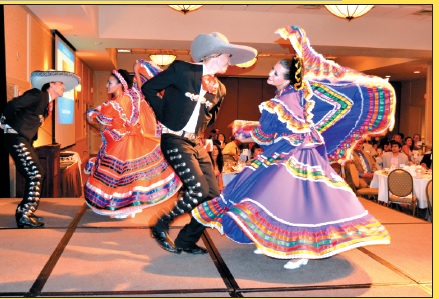
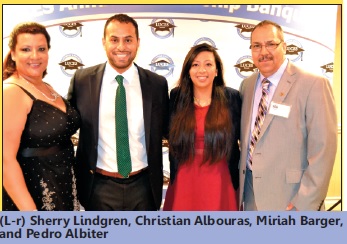
Dr. Jack E. Daniels, president of Madison College, congratulated the students and talked about the increasing debt students were facing in higher education. “It’s important that many students who may not have the advantages of others find those scholarship funds,” Daniels said. “I believe that, especially for people of color, it’s necessary that we open our institutions so that they will be able to obtain their goals. One day, our young folks will be the president of Madison College, the superintendent of our school districts, our governors, our mayors. That’s why it’s very important that we support our students; especially here this evening.
“At Madison College, we look forward to a long-standing, sustainable relationship with LUCES so that students will be able to reach their dreams,” he added.
Keynote speaker Dr. Enrique E. Figueroa, director of the Roberto Hernandez Center at the UW-Milwaukee, told the crowd that almost one in four children in our country today are Latinos. “Most people are not aware just how fast the children population is increasing in our country,” Figueroa said. “This is very important because we need to be geared up to educate these children in the next 10 or 20 years.”
Figueroa quoted Frederick Douglass who said, “It is easier to build strong children than to repair broken men.”
“We are investing now more money in fixing broken men than in building strong children. That is not a good strategy. That is not a good use of our tax dollars,” he told the crowd.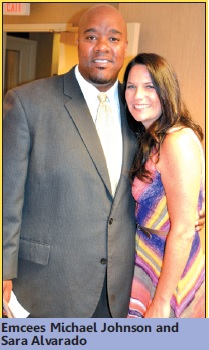
Figueroa said that there are roughly 18 million Latinos 25 years of age and older that do not have a college degree. “I bring this up because I think it’s important that we don’t lose sight that we have to educate an adult population as far as the Latino population is concerned. That’s a very significant challenge for us,” he said.
Figueroa said that Latinos must continue to affirm their place in this nation, to carve larger and more significant spaces in society and in its institutions, and must revitalize the ideals of this nation. “Immigrants today value family. They value community. They have strong faith. They value hard work. Those are the four principles in [the] 1700s in our country,” Figueroa said. “It’s the same today. And yet we have not defined ourselves as such as Latinos. We have fundamentally the same kind of values and principles as the values and principles that this country was formed upon.”
In the world you’re either defining yourself or your being defined, Figueroa concluded. “How is it that we define ourselves? What are the tools that we need — las herramientas as we say in Spanish — to define ourselves? And to do it in a manner that is not threatening. To do it in a manner that not only serves our interests; but serves the country’s interests. We do need to define ourselves. That gives us strength. That gives us a place … and that gives us hope.”
